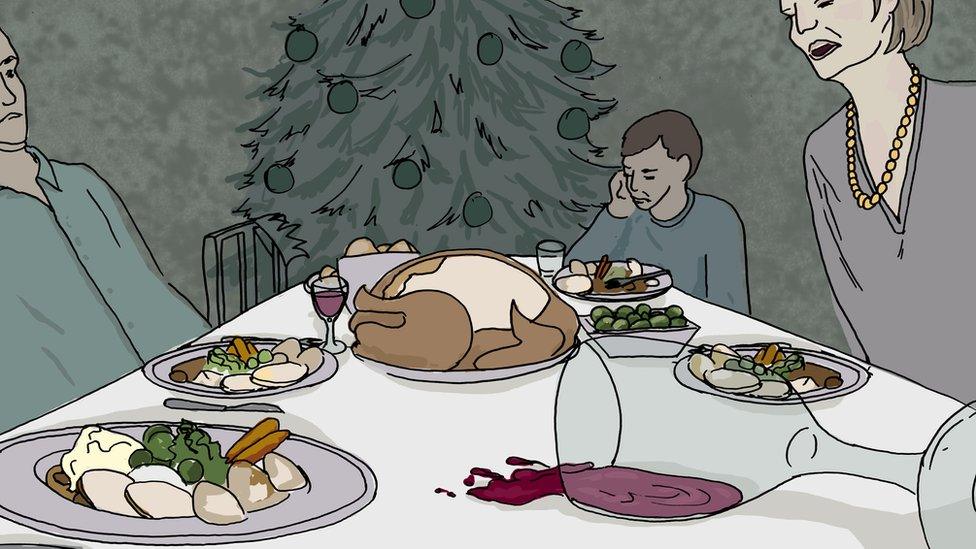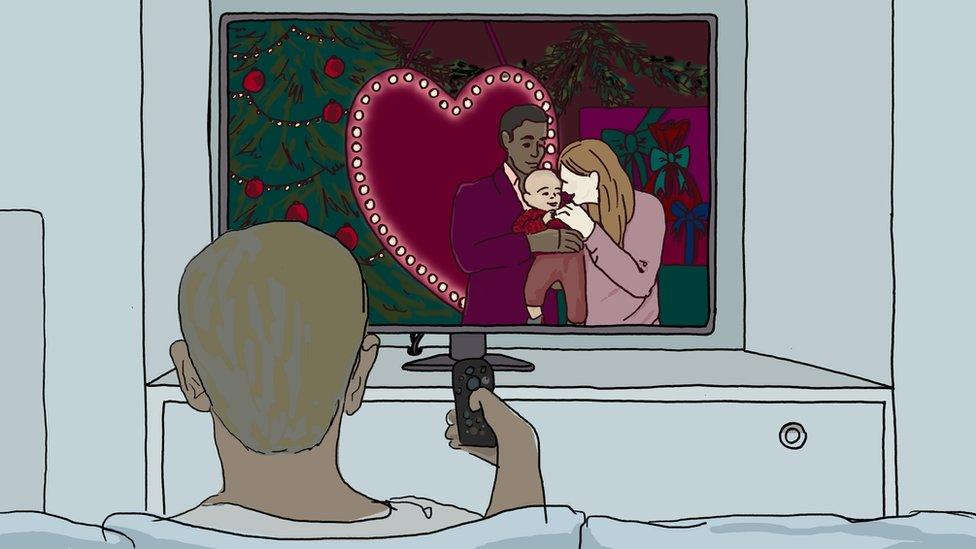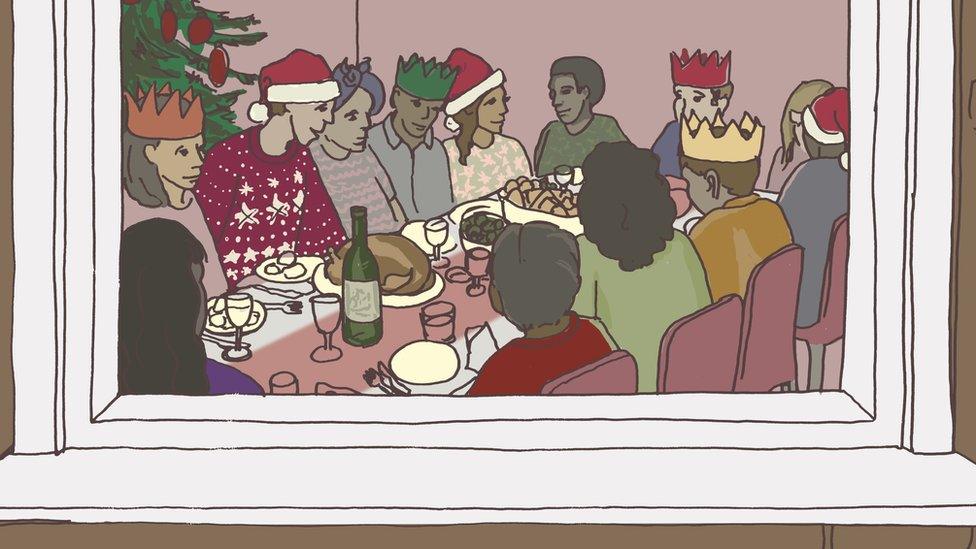'Why it's OK I'm not seeing my family this Christmas'
- Published

'All the adverts are families in a house together, and that's not what a family is these days'
Lauren and her mum have always had a difficult relationship.
"We're quite similar, and we clash because of that," says 27-year-old Lauren - not her real name.
"I don't think she likes opinions that aren't her own. It's always ended up with me trying to resolve things. As I've got older I've thought that I can't let her control me any more."
She and her mum no longer speak since a death in the family drove them apart.
"I've removed my mum from all social media, and she's made it clear that if she found out I was in contact with my dad and sister, there'd be trouble," she says.
This means Lauren is one of many people who are estranged from their family and aren't with them this Christmas.
Rachel Melville-Thomas, a psychotherapist who works with young adults, says not talking or having contact with your family is more common than you think.
"It often comes out of difficult situations, like a divorce in the family, or where somebody's lifestyle has really compromised family relations. If somebody is perhaps abusing drugs or alcohol, they might estrange themselves, and people fall out about money quite a lot."
She says being disconnected from family can affect people's self-esteem and make times like Christmas challenging.
"The last thing I want is pity - this is my new normal," Lauren says. "I don't want people feeling like they have to invite me to theirs because I've got nowhere to go. In previous years I've volunteered with the homeless or been with friends, and even some work colleagues have said I can go to theirs. So I do have options."
"I hate the hype around Christmas," she continues. "All the adverts are families in a house together, all happy, and that's not what a family is these days. I don't think there's fair representation, for example, of same-sex parents, or children raised by other relatives. I feel like I'm being suffocated by something I hate."

'It will inevitably be a sad day'
'A more equal dynamic of people spending the day together'
Sarah - also not her real name - is estranged from her family after having a traumatic Christmas last year when she brought her boyfriend home to meet her parents.
Her family, who are Christian and white, made it clear that her boyfriend - who isn't white or religious - was not welcome.
"My parents are fairly religious so the holiday has quite a lot of significance," says Sarah, who is in her 20s.
"There were small things happening - so small you can't pin them down - which made it clear he wasn't wanted."
After her boyfriend left, Sarah confronted her parents.
"They said things about who did and didn't fit into our family, which revealed views that were significantly more conservative than I'd ever known them to hold.
"It became very clear that him being partly from a Muslim family was an issue. He's an atheist and my mum pinned that as: 'What if you have kids? Will they be baptised?'"
"And the hardest thing to get them to talk about was that he is black and they said our wider family would have a problem with that."
Sarah was devastated.
"Everybody has these stories of sort of censoring themselves a little bit around their family or having arguments with their grandparents about Brexit or whatever.
"But I realised that for me those differences were so great that it started to feel like playing nice was not acceptable any more.
"It drove a wedge between us because it made me feel like these people who I have derived so much of my moral upbringing from hold views that are so wrong. There's been an immense loss of trust."
It's OK to choose not to speak to your family, Rachel says: "When very difficult conflicts have happened or you feel things have broken down, you have to put a few fences up to protect yourself, especially for young people who feel criticised or put down by difficult relationships."
Sarah has now moved abroad. Families she knows in the UK have invited her to their Christmases this year, but she's staying abroad and seeing friends for "a more equal dynamic of people spending the day together. Rather than something that kind of reminds you of the fact that you're not with your own family."
'It's sad when no-one's giving you anything'
Growing up, AJ spent Christmas day in his care home.
He went into full-time care at 15 after his mum struggled to deal with his health issues - he has autism and struggled to walk when he was young.
"My care home was rubbish at looking after kids. Police were called there almost every night, children went missing," he says. "I saw knives, I saw drugs, everything."
"They hardly even bothered to attempt to do something nice at Christmas, I would just be in my room.
"It's sad when no-one's giving you anything, no one's saying 'Merry Christmas', no-one's coming around, no-one's even gonna have dinner with you."
AJ, now 19, doesn't have a good relationship with his mum but says they are working on improving it.
"I've always had a little bit of resentment towards my mum for putting me in care, but I can see why she thought she needed to do what she did."

A dinner for care leavers was 'magical' says AJ
Last Christmas, AJ searched Facebook and found an event for care leavers set up by the community in the city he lives in. He went to the dinner, not knowing anybody there, and says it was the "one of greatest experiences of his life".
"All of the people there didn't have someone to spend Christmas with so we spent it together, it was magical.
"We had a proper nice meal, and did Christmas crackers - the ones you pull - I'd never done one of them before!"
"There was a room with a load of bags in it. I saw a bag with my name on it and inside was a bunch of gifts just for me. And it wasn't just your tacky gifts - they actually went all out.
"I cried in that moment, I didn't expect that kindness from people I'd never met before.
He is excited to spend this year's Christmas at the care-leavers dinner again.
'It always seemed to get worse around the holidays'
This will be the fifth Christmas Kheyla - not her real name - has spent without her parents. The 24-year-old says her parents were emotionally abusive when she was growing up.
"My mum wasn't well and she ended up taking it out on us, and my dad kind of just let it happen.
"Times like Christmas were especially difficult. It always seemed to get worse around the holidays."
Kheyla and her sister distanced themselves from their parents after leaving home, starting with not seeing them at Christmas: "I decided I was going to take that back for myself, and spend it with people I actually want to spend it with."
Even though they have chosen to estrange themselves, Christmas is a difficult time: "Friends talk about going home for Christmas and being with their big family and you can feel quite isolated."
Kheyla and her sister will be seeing Kheyla's best friend, who chooses to spend the day with them instead of his own family. "He knows that we don't have a family to spend it with. It means the world to me."
She is slowly beginning to repair her relationship with her parents.
Kheyla's advice for someone who is estranged from family is to make sure you spend time with anyone you do have in your life: "Or if you don't have people, try and reach out to someone.
"You'd be surprised that there are probably people in your life that would be willing to have you over for Christmas because they wouldn't want you to be alone."
If you have been affected by any of the issues raised in this article help and advice is available here.


Follow Newsbeat on Instagram, external, Facebook, external, Twitter, external and YouTube, external.
Listen to Newsbeat live at 12:45 and 17:45 weekdays - or listen back here.